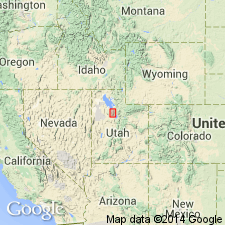
- Usage in publication:
-
- Markham Peak Member*
- Modifications:
-
- Named
- Dominant lithology:
-
- Quartzite
- Sandstone
- Siltstone
- AAPG geologic province:
-
- Great Basin province
- Wasatch uplift
Summary:
Named as upper member of Bingham Mine Formation (new) of Oquirrh Group (rank raised) for Markham Peak, central Oquirrh Mountains, Tooele Co, UT, Great Basin province, and Salt Lake Co, UT on Wasatch uplift. Is part of Bingham sequence. Type section designated and measured in secs 30 and 31, T3S, R3W, and secs 21 and 22, T3S, R3W, Bingham Canyon quad. Overlies Clipper Ridge Member (new) of Bingham Mine Formation. Upper contact is an erosion surface at type. Is incomplete. More than 4,300 ft measured at type where orthoquartzite, calcareous quartzite, calcareous sandstone, and siltstone are interbedded. Includes a few thin (1-3 ft) fusulinid-bearing arenaceous gray limestones which serve as marker horizons. Chert pebble conglomerates also occur. Orthoquartzite is buff to tan, medium grained, detrital, silica cemented, medium bedded to massive, locally banded, cross bedded, ripple marked, and shows channel scour and fill. Calcareous quartzite is light tan gray, sandy, carbonate cemented. Fossils: corals, bryozoans, brachiopods, and fusulinids (listed). Assigned a Late Pennsylvanian, Missouri and Virgil age. Columnar sections. Correlation chart.
Source: GNU records (USGS DDS-6; Denver GNULEX).
For more information, please contact Nancy Stamm, Geologic Names Committee Secretary.
Asterisk (*) indicates published by U.S. Geological Survey authors.
"No current usage" (†) implies that a name has been abandoned or has fallen into disuse. Former usage and, if known, replacement name given in parentheses ( ).
Slash (/) indicates name conflicts with nomenclatural guidelines (CSN, 1933; ACSN, 1961, 1970; NACSN, 1983, 2005, 2021). May be explained within brackets ([ ]).

